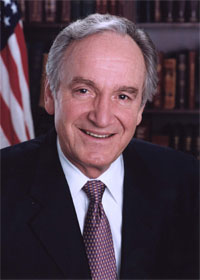Anti-bullying measures left out of education bill

Tom Harkin
In a blow to activists seeking to stop anti-gay bullying, two proposals to address bullying in schools were left out of an education reform bill approved by a U.S. Senate committee October 20. And a proposal to explicitly prohibit anti-LGBT bullying was stripped out. But senators who support the efforts have promised to try to insert language once the full education bill reaches the floor.
The Senate Committee on Health, Education, Labor, and Pensions approved revisions to the Elementary and Secondary Education Act, the key federal statute governing primary and secondary education, in a 15 to 7 vote. The version of the Act implemented by Congress at the behest of President George W. Bush was better known as “No Child Left Behind.” President Obama has said reform of the Act is one of his highest priorities.
Human Rights Campaign President Joe Solmonese said in a statement that the annual reauthorization of the Act “was the best opportunity the Senate will have in this Congress to address the problem of bullying faced by LGBT students” and that he was “disappointed” the Committee did not do so.
The two primary anti-bullying measures that LGBT advocates have hoped would be part of that bill are the Student Nondiscrimination Act (SNDA) and the Safe Schools Improvement Act (SSIA).
SNDA would prohibit elementary and secondary schools from discriminating against students on the basis of real or perceived sexual orientation or gender identity in any program or activity receiving federal funds. “Discrimination” would include harassment, bullying, intimidation, and violence based on sexual orientation or gender identity.
The Safe Schools bill (SSIA) would require schools and districts receiving federal funds to implement and report on anti-bullying programs. It would require that anti-bullying programs specifically address bullying and harassment based on actual or perceived sexual orientation and gender identity, among other attributes.
A 2009 survey of students by GLSEN (the Gay, Lesbian, and Straight Education Network) found that students are more likely to report problems and staffers are more likely to help them, where school policies explicitly prohibit bullying based on sexual orientation and gender identity.
During the committee hearing, U.S. Senator Al Franken (D-Minn.) introduced but then withdrew SNDA as an amendment. In withdrawing it, Franken said there were some members who felt that including the language at this point would take bipartisan support away from the whole reauthorization bill.
Franken, in an eight-minute statement before the committee, explained that SNDA would protect students like Justin Aaberg, Seth Walsh, and Carl Joseph Walker-Hoover, who each died by suicide after suffering relentless anti-gay bullying.
He placed SNDA in the context of previous civil rights bills that addressed discrimination on the basis of race and gender. SNDA, he said, “follows a long precedent of Congress stepping to protect the most vulnerable members of American society when they face pervasive discrimination.”
Franken said committee Chairman Senator Tom Harkin (D-Iowa) has promised to help him get a vote on an SNDA amendment when the education bill goes to the Senate floor. And he said Senator Mark Kirk (R-Ill.) agreed to work with him to “find compromise language that he can support as a co-sponsor before we bring this vote to the floor.” Kirk is the lone Republican co-sponsor of SSIA.
Like Franken did for SNDA, Senator Bob Casey (D-Pa.) introduced but then withdrew the Safe Schools language.
A third measure that was incorporated into the original education bill was “Successful, Safe, and Healthy Students,” which Harkin himself had introduced as a standalone bill last May. It seeks to give states grants to develop programs that support student health, prevent bullying, violence, and drug use, and promote “safe and supportive schools.”
Local education agencies applying for the grants would, among other things, have to establish policies prohibiting conduct that creates “a hostile or abusive educational environment.”
But the version of that program that was approved as part of the education bill Thursday stripped out language that would have required participating schools specifically to prohibit bullying and harassment based on sexual orientation and gender identity.
A Harkin spokesperson said that, if the SNDA provisions are approved as an amendment, they would require all schools receiving federal funds, including those receiving Successful, Safe, and Healthy Students grants, to establish enumerated, LGBT-inclusive anti-bullying policies.
The spokesperson said Harkin is hopeful the full Senate will approve the SNDA provisions as a floor amendment. She confirmed that “Chairman Harkin is committed to working with Senator Franken to ensure that happens” and that Harkin will also work with Senator Casey so that “all students are given the opportunity to succeed free from harassment or discrimination.”
Senator Casey also issued a statement saying that he would work “to see enumerated protections added to [the education bill] when it comes to the Senate floor.”
But passage of such amendments through the floor vote will be more difficult.
All 12 of the Democrats (and one Independent, Bernard Sanders of Vermont) on the 22-member committee are co-sponsors of SNDA, which would have given it enough votes for passage in committee.
Ten Democrats, plus one Republican, are co-sponsors of Safe Schools—one shy of a majority.
Overall, SNDA has 35 sponsors. None are Republicans. Safe Schools has 33 sponsors in total, including Kirk.
Neither the Health, Education, Labor, and Pensions Committee spokesperson nor Senate Majority Leader Harry Reid’s office could confirm when the full Senate might hear the education bill.


Leave a Reply